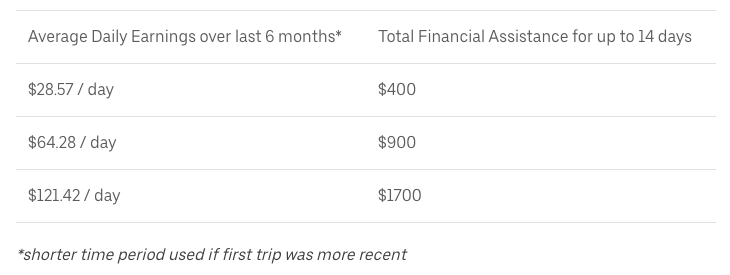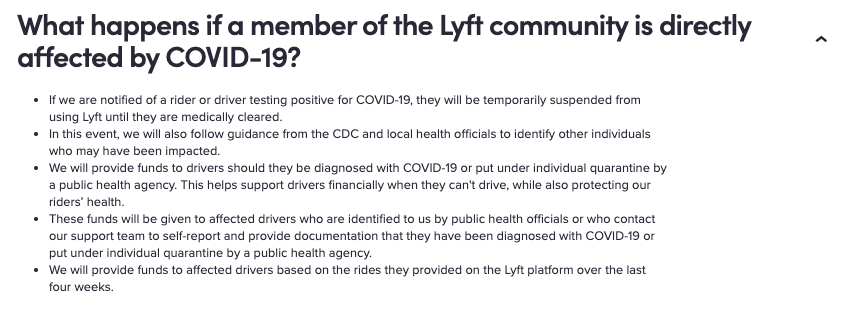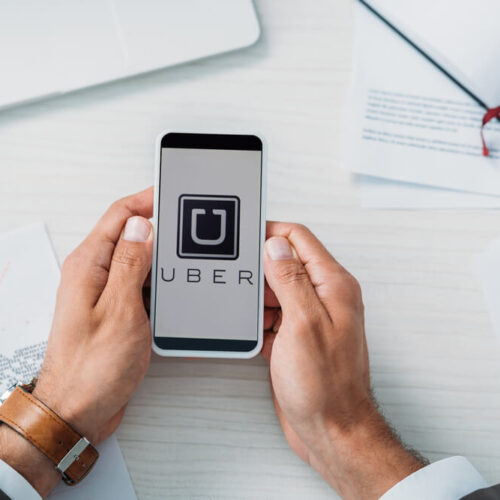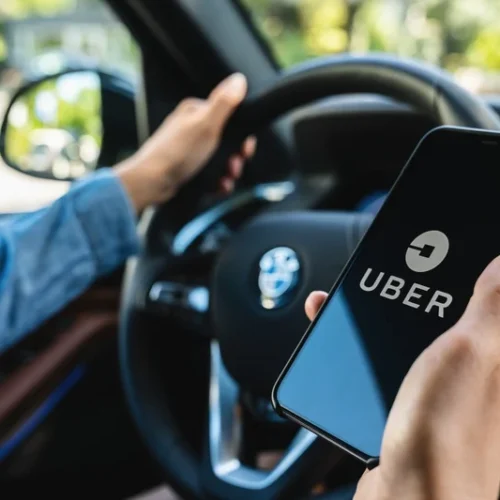Almost everyone agreed in our recent driver/coronavirus survey that Uber and Lyft aren’t doing enough to help drivers during this tumultuous time. But news has been changing rapidly – and rideshare/delivery companies are listening. Below, senior RSG contributor Paula Gibbins outlines what companies are offering gig workers – but there’s a catch.
Everybody is talking about COVID-19 and how it’s affecting drivers, but what is being done to actually help drivers?
We may be gig job independent contractors who do not receive sick leave or any kind of paid time off, but with a global pandemic, the rules change just a bit.
Today I’m going to be outlining what the major gig economy companies are offering to drivers who are diagnosed with COVID-19 or are quarantined by a public health official. All of them are offering the same basic thing, but there are enough discrepancies and differences that I’ll go through each one.
I’ve organized by name of each company, so you can just review the ones you drive for so you know what to expect.
One thing I cannot stress enough is that this financial assistance is only being offered if you are diagnosed with COVID-19 or told by a public health official to be put under quarantine. This is not meant to cover any and all illnesses or from self-diagnosis.
Quick links:
- Submit a claim for Uber driver assistance
- Read more about Lyft’s COVID-19 policy
- Read more about Instacart’s policy here
- Submit a claim to DoorDash here
- Visit the Postmates Fleet Relief Fund here
Make sure to sign up for the Rideshare Guy newsletter to get all the latest on coronavirus updates, gig work opportunities and more.
Uber
Although it took a while for any of the companies to respond to the coronavirus outbreak, Uber has been the leader here. Over the weekend, they announced clearer guidance for how they’re handling financial assistance to drivers:
“Any driver or delivery person who is diagnosed with COVID-19 or is individually asked to self-isolate by a public health authority will receive financial assistance for up to 14 days while their account is on hold. We’ve already helped drivers in some affected areas, and we’re working to quickly implement this worldwide.”
On March 15, Uber provided more information about the financial assistance, with this example of an estimate of financial assistance drivers in San Francisco could expect to receive.
Depending on how much they earned over the prior six months, our hypothetical San Francisco drivers could earn from $400 to $1700 – the amount of assistance you will receive is based on your average daily earnings over the last six months.

You can read more about the breakdown in earnings if you are diagnosed with COVID19 and how to submit documentation here.
The tricky part about this is Uber wants you to prove you have COVID19 with either documentation from a licensed medical provider or public health authority or an order from one of the two requiring you to self-isolate.
At this stage in the coronavirus panic, many hospitals are already becoming overwhelmed with serious cases of the virus – and Uber wants you to go to your doctor (or worse, the emergency room if you don’t have a doctor) to get a note written?
I understand Uber wants proof in order to compensate drivers, but this just seems like it’s making it worse. Maybe Uber could provide telemedicine with access to doctors and not require potentially sick people to interact with more potentially sick people!
Note: If you are looking for telemedicine options, check out AccessADoctor telemedicine. Using our sign up code, you’ll receive a discount on monthly plans for you or your family.
To read all of Uber’s advice during this pandemic, see their Coronavirus (COVID-19) Resources & Updates page.
Lyft
Lyft still hasn’t announced how much money a driver could earn if affected by COVID-19. They simply say “we will provide funds to drivers should they be diagnosed with COVID-19 or put under individual quarantine by a public health agency.”

If you are diagnosed with COVID-19 or have been put under individual quarantine by a public health official, you can provide documentation to Lyft’s support team and from there they will provide you with funds based on your performance on their platform over the previous four weeks.
Again, the same issue with this is the one we have with Uber’s: asking health providers to take time from their busy schedules right now to evaluate patients/drivers who suspect they may have the coronavirus but aren’t sure. Lyft shares what the symptoms of COVID-19 are, but even specifically say 80% of people will feel like it’s a ‘bad cold or flu.’
In many cases, drivers won’t necessarily want to go to their doctor (and pay a co-pay) for something that seems like a cold, yet will likely self-quarantine any way because of how they feel and because of what’s going on right now. Should these drivers drag themselves into a doctor’s office or emergency room for a piece of paper to prove they need financial assistance? It doesn’t seem to be an efficient use of resources.
To see all that Lyft has to say about the COVID-19 situation, read Lyft’s Guidance page.
Instacart
Instacart has taken an extra step in helping their shoppers/drivers. On March 9, 2020, Instacart announced that they are:
“…introducing a new sick pay policy for all in-store shoppers nationally to offer more support to this valued community. All Instacart part-time employees now have access to sick pay, an accrued benefit that can be used as paid time off if you are absent from work due to illness or injury.
We’ve previously offered sick pay in select states — now, all part-time employees across North America, including in-store shoppers, will be able to accrue sick time to use as needed in the event that they become ill. All sick pay accrual will be backdated from the start of the year, so all hours worked by our in-store shoppers since then will count towards their current, individual sick pay balance.”
On top of that, they are also introducing a similar 14-day sick leave option for those diagnosed with COVID-19:
“In addition to sick pay for all in-store shoppers nationally, we’re also offering additional support for all part-time employees and full-service shoppers affected by COVID-19. We will offer up to 14 days of pay for any part-time employee or full-service shopper who is diagnosed with COVID-19 or placed in mandatory isolation or quarantine, as directed by a local, state, or public health authority.
This assistance will be available for 30 days to ensure our community is supported during this rapidly evolving situation, and we’ll be sending more information to shoppers in the coming days. To the best of our knowledge, no one in our community has contracted COVID-19, but we believe this is the right thing to do for our employees and shoppers.”
It specifies that it’s available for the next 30 days, but if the situation doesn’t improve before the 30 days are up, I’d bet they will extend that to cover a longer period of time.
For more information about these updates and how to proceed during the COVID-19 pandemic, read the Introducing New Guidelines and Policies to Support the Health and Safety of the Instacart Shopper Community article.
DoorDash
DoorDash has similar policies to the rest, but they also outline how to submit a claim if you are diagnosed and would like to partake in this financial assistance. Here’s what they say about the financial assistance they are offering:
“In response to the public health emergency posed by COVID-19, we’re announcing a new COVID-19 Financial Assistance Program. With this program, Dashers in the United States (including Puerto Rico), Australia, and Canada may qualify for up to two weeks of financial assistance* if they are diagnosed with COVID-19 or put under quarantine individually by a public health agency. To be eligible, Dashers must have been active on the DoorDash platform for at least 60 days and have completed at least 30 deliveries in the last 30 days.”
In order to file a claim, you’ll need to submit it via their support web form. They walk you through what options to choose on the form and how to get your account reactivated once you are cleared of COVID-19 on their COVID-19 help page.
Postmates
Postmates is the most detailed of all of them because, on top of the 14-day sick leave pay, they “launched the Postmates Fleet Relief Fund, which aids our Postmates in covering the costs of co-pays or medical expenses related to COVID-19, regardless of diagnosis.” Read more about what that means at the link. I’ll also be outlining a few key points here.
This relief credit is not necessarily available to all of their drivers. Instead, a driver has to meet the following criteria in order to receive this extra aid:
- Live in one of the states/districts with reported cases of COVID-19 (all 50. at this point)
- Have completed at least one delivery on the Postmates platform in the last 14 days
- Have a Starship Health Savings Account (HSA). If you are not currently a member of the Postmates HSA, please see What is Starship HSA and how can I join?
The list of eligible states is being updated as more cases are discovered across the U.S. Keep in mind, the above criteria is only for the extra financial assistance they are offering. You’ll still be eligible for the 14-day paid sick leave if you are diagnosed with COVID-19.
Read more about how you’re covered on the Postmates Coronavirus (COVID-19) Response page.
It’s important to keep in mind that to qualify for any type of financial aid as a driver, you must be diagnosed with COVID-19. Given how overwhelmed hospitals are right now and how few tests there are currently available, you may not be lucky enough to live in a city where there are available tests – particular if your symptoms don’t look too bad, as they will for at least 80% of the population that contracts COVID-19.
Your best bet, if you feel sick, is to stay at home and not spread the disease any further, regardless of what it is. That’s easier said than done, though, for those of you who rely on this for your full-time gig.
Drivers, have any of these companies or others reached out to you about compensation or even how to access the tests? Let us know what you think of the response below.
-Paula @ RSG
Resources:




